How Old Are You? may refer to:
- How Old Are You? (album), a 1983 solo album, by Robin Gibb
- "How Old Are You?" (Miko Mission song), 1984
- How Old Are You? (film), a 2014 Malayalam-language movie starring Manju Warrier
How Old Are You? may refer to:
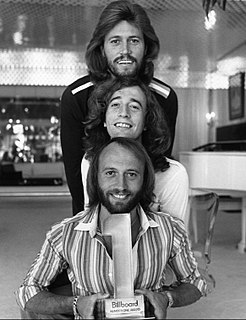
The Bee Gees were a music group formed in 1958, featuring brothers Barry, Robin, and Maurice Gibb. The trio were especially successful as a popular music act in the late 1960s and early 1970s, and later as prominent performers of the disco music era in the mid- to late 1970s. The group sang recognisable three-part tight harmonies; Robin's clear vibrato lead vocals were a hallmark of their earlier hits, while Barry's R&B falsetto became their signature sound during the mid- to late 1970s and 1980s. The Bee Gees wrote all of their own hits, as well as writing and producing several major hits for other artists.
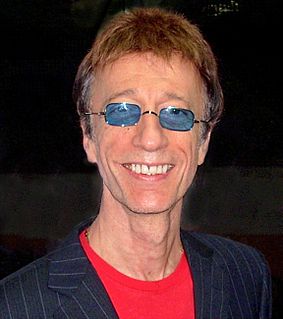
Robin Hugh Gibb was a British singer, songwriter and record producer, who gained worldwide fame as a member of the pop group the Bee Gees with older brother Barry and fraternal twin brother Maurice. Robin Gibb also had his own successful solo career. Their younger brother Andy was also a singer.

Maurice Ernest Gibb was a British musician, singer, songwriter and record producer who achieved fame as a member of the Bee Gees. Although his elder brother Barry Gibb and fraternal twin brother Robin Gibb were the group's main lead singers, most of their albums included at least one or two songs featuring Maurice's lead vocals, including "Lay It on Me", "Country Woman" and "On Time". The Bee Gees were one of the most successful rock-pop groups of all time.

Sir Barry Alan Crompton Gibb is a British-American musician, singer-songwriter and record producer who rose to worldwide fame as a co-founder of the group the Bee Gees, one of the most commercially successful groups in the history of popular music. With his younger brothers, twins Robin and Maurice Gibb, he formed a songwriting partnership beginning in 1955. He has lived in Britain, Australia, and the United States, holding dual UK–US citizenship.

The Bee Gees Sing and Play 14 Barry Gibb Songs is the debut studio album by the Bee Gees. It was released in November 1965 on the Australian Leedon label. It is a compilation of most of the Gibb brothers' singles that had been released over the previous three years in Australia, which accounts for the many different styles of music on it.

To Whom It May Concern is the tenth album by the Bee Gees. Released in October 1972, it is the follow-up to, and continues the melancholic and personal sound of, its predecessor Trafalgar. The album was recognised as "a farewell to the old Bee Gees" as the album marked the end of an era for the group in several ways: it was their last album to be recorded solely at IBC Studios, in London, their last with conductor and arranger Bill Shepherd, who had guided them since 1967, and their last under their first contract with Robert Stigwood. Some of the songs were old ones finished or rewritten for the occasion. To Whom It May Concern has sold approximately 350,000 copies worldwide.

"How Can You Mend a Broken Heart" is a song released by the Bee Gees in 1971. It was written by Barry and Robin Gibb and was the first single on the group's 1971 album Trafalgar. It was their first US No. 1 single and also reached No. 1 in Cashbox magazine for two weeks.

"First of May" is a song by the Bee Gees with lead vocals by Barry Gibb, released as a single from their 1969 double album Odessa. Its B-side was "Lamplight". It also featured as the B-side of "Melody Fair" when that song was released as a single in the Far East in 1971 as well as in 1976 and 1980 on RSO Records. It was the first Bee Gees single to be released after lead guitarist Vince Melouney had left the group.
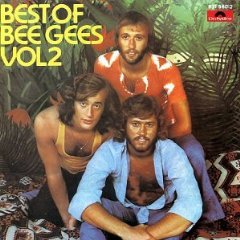
Best of Bee Gees Vol. 2 is a compilation album of hits by the Bee Gees released in 1973. The album, briefly revived on CD in the late 1980s, went out of print, but was reissued by Rhino in November 2008.
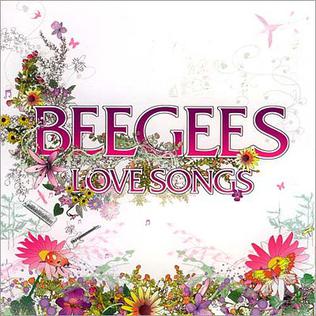
Love Songs is the third Bee Gees compilation album in four years, though the first to cover a specific musical style. A proposed album of love songs was in the works around 1995 when the Bee Gees recorded their own versions of "Heartbreaker" and "Emotion", but that project was soon shelved and those recordings remained unavailable until the release of Their Greatest Hits: The Record in 2001.

Here at Last... Bee Gees... Live is the first live album by the Bee Gees. It was released in May 1977. It reached No. 8 in the US, No. 8 in Australia, No. 1 in New Zealand and No. 2 in Spain, and sold 4.6 million copies worldwide.
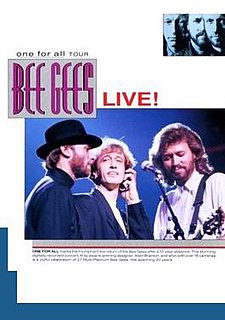
One for All Tour is a concert video from The Bee Gees recorded live at the National Tennis Centre in Melbourne, Australia in November 1989. Melbourne was the third final stop on their 1989 One for All World Tour, which included the United States, Europe and Asia the first time the Bee Gees played live there since their 1979 Spirits Having Flown Tour. Originally, this video was released in two volumes on VHS, each 50 minutes apiece. Volume One incorrectly listed the song "My World" from 1972 instead of the song "World" from 1967. In the DVD era, the cover was slightly changed and was released under the title The Very Best of The Bee Gees Live! in 1997.

How Old Are You? is the second solo album released by singer Robin Gibb in 1983, thirteen years after his debut Robin's Reign in 1970. The album was not a great success in America and failed to chart in Britain but it did spawn an international hit in "Juliet" which topped the charts in Germany. The album reached No. 6 in Germany. The album was produced by Robin and Maurice Gibb with Dennis Bryon.

Secret Agent is the third solo album by English singer Robin Gibb, released in 1984. The album enjoyed limited success, mostly in Europe and Australia. The lead single "Boys Do Fall in Love" made the Top 10 in Italy and South Africa.

"Juliet" is a 1983 single by British singer-songwriter Robin Gibb, from his second solo album How Old Are You?. The song was a huge hit in various countries in Europe, hitting the No. 1 spot in Germany, Italy and Switzerland and peaking at No. 2 in Austria. In addition, the single was certified gold by the German Bundesverband Musikindustrie in 1983. A music video was also made for this song.
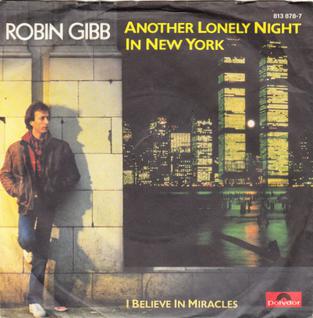
"Another Lonely Night in New York" is a 1983 single by the late British singer-songwriter Robin Gibb from his second solo album How Old Are You?. The song managed to chart in several countries in Europe, reaching the Top 20 in Germany and Switzerland, peaking at numbers 16 and 19, respectively. It was not released in the United States as a single.

"How Old Are You" is a single released by Robin Gibb, the third and final single released from the album of the same name in October 1983. It reached #93 in the UK and #37 in Germany. "How Old Are You" likewise has the rhythm guitar beat, bang-away drumming, a powerful horn and synthesizer blend.

Magnet is the fifth solo album by Robin Gibb of the Bee Gees, released in 2003. The song "Love Hurts" was originally recorded by The Everly Brothers, and he re-recorded the songs "Another Lonely Night in New York" and "Wish You Were Here".

"Country Woman" is a song written and released by British rock band Bee Gees. It was written and performed solely by Maurice Gibb, and released as a B-side of "How Can You Mend a Broken Heart", which was the group's first US No. 1. The songs were released as a double A-side in Germany, France, Japan and Canada.

Robin Gibb is the first EP released by British singer-songwriter Robin Gibb, released in 1985 on Amiga Records in the German Democratic Republic only.